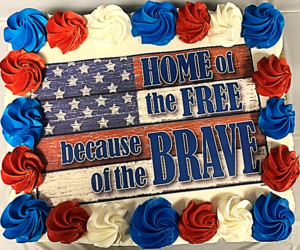
Memorial Day is a special, yet somber moment for many of us who have lost relatives, friends, or colleagues who fought and paid the ultimate sacrifice fighting for the precious gift of our freedom. Every year, HRV recognizes Memorial Day by sharing a 30-minute “Remember and Honor” presentation with its employees to recall military family members and friends. We also recognize some family members who lived through past conflicts because of the sacrifices of others. Below, is a collection of this year’s remembrances shared by HRV employees.
For myself Memorial Day brings to mind and heart the Pennsylvania Army National Guard; the “citizen-soldiers” with whom I served. While the guard receives little attention, its history precedes the revolutionary war. Its members throughout time consist of people you may pass on the street today, who have volunteered to leave their homes, families, and businesses on a moment’s notice to defend freedoms many of us take for granted. While I was fortunate not to have ever been called up, after my discharge, my unit, the 28th Infantry Division 1/110th Infantry, was sent to Iraq, and some of the people I once served with did not return. I’m forever humbled by their sacrifice, and the ongoing “empty-chair” sacrifice of their families. The freedoms we enjoy today, someone literally paid for with their lives; and their family may be sitting with us right now.
– Brian Mishler, Inspector
Coming from a family with strong military roots, I was raised with a love of Country, and pride and respect for those who defend my freedom and liberties. Every year, around this time, my mind takes me back to when I was a youngster, on a family trip to Washington D.C. We were at the Vietnam Veterans Memorial (The Wall). The Memorial was still new and this was our family’s first time there. I recall walking with my dad, who is a Marine Corps veteran, having served multiple tours in the Vietnam conflict. The “old man” was uncharacteristically quiet. That was the first time I had ever seen tears in my dad’s eyes. In the years since, I have returned to that place many times, and no matter how many times I see it, the sight of over 58,000 names etched into the stone is overwhelming and humbling.
– Kevin Keating, Project Manager
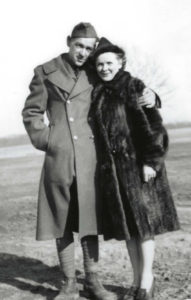 There isn’t a Memorial Day when I don’t think about my Nana’s brother Buddy (left) who died in Normandy, France. I clearly never got to meet him, but she was so proud of him and told us about him when we were kids. I am proud of my nephew’s current service in the Army, and for my Gramp, dad, and uncle for their service in the Navy. My heartfelt thank you and deepest gratitude goes to all Gold Star families and their fallen heroes. They have given the ultimate sacrifice and will never be forgotten.
There isn’t a Memorial Day when I don’t think about my Nana’s brother Buddy (left) who died in Normandy, France. I clearly never got to meet him, but she was so proud of him and told us about him when we were kids. I am proud of my nephew’s current service in the Army, and for my Gramp, dad, and uncle for their service in the Navy. My heartfelt thank you and deepest gratitude goes to all Gold Star families and their fallen heroes. They have given the ultimate sacrifice and will never be forgotten.
– Betsy Wehner, Marketing Coordinator
I just wanted to take a moment and thank you for your dedicated service to protect our freedom. I think we tend to take it for granted, especially when we are far away from any conflicts. Please know that we pray for you and your families as you protect us each and every day.
– Barry Bender, Project Manager
I greatly appreciate all those who have given their lives so I’m able to live in a free country.
– ANONYMOUS
Thanks to all our veterans for freedom to worship, work, life, liberty and pursuit of happiness. God Bless the USA.
– William Finnen, Inspector
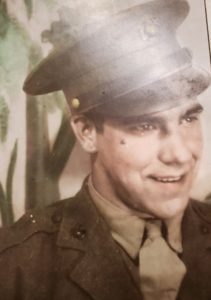
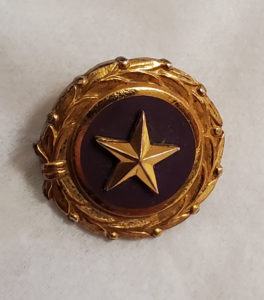 “My Wife’s great grandmother was a Gold Star Mother, two of her sons served in World War II. The oldest, Andrew Dean (shown left), a PFC in the 22nd Marine regiment, was killed in action during the Battle for Eniwetok Atoll, Marshall Islands. The US forces had 85 casualties in this battle while the Japanese forces lost nearly 1,300 men. The capture of the Marshall Islands allowed the Allies to liberate Guam and the Philippines.”
“My Wife’s great grandmother was a Gold Star Mother, two of her sons served in World War II. The oldest, Andrew Dean (shown left), a PFC in the 22nd Marine regiment, was killed in action during the Battle for Eniwetok Atoll, Marshall Islands. The US forces had 85 casualties in this battle while the Japanese forces lost nearly 1,300 men. The capture of the Marshall Islands allowed the Allies to liberate Guam and the Philippines.”
– Richard Fulton, Project Manager
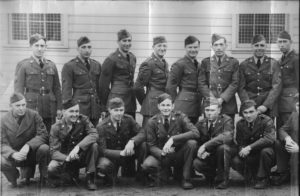 My father was born in Austria September 18, 1919. He, his mother, father, and sister emigrated to the United States in 1926. He entered the service May 13, 1941, and was discharged as a Tech Sergeant on October 10, 1945. He spent his entire military service overseas in the Pacific Theater during the World War II. It is interesting that he spoke fluent German but was assigned to the Pacific.
My father was born in Austria September 18, 1919. He, his mother, father, and sister emigrated to the United States in 1926. He entered the service May 13, 1941, and was discharged as a Tech Sergeant on October 10, 1945. He spent his entire military service overseas in the Pacific Theater during the World War II. It is interesting that he spoke fluent German but was assigned to the Pacific.
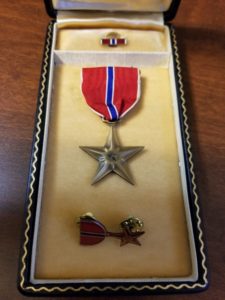 He received a Bronze Star (shown right) for his bravery during infantry patrols in New Guinee and the Philippines. He carried a Thompson submachine gun, which he said he successfully used. He was there, to witness firsthand, General MacArthur’s “return” to the Philippines. He commented that he had been there three weeks before the big event.
He received a Bronze Star (shown right) for his bravery during infantry patrols in New Guinee and the Philippines. He carried a Thompson submachine gun, which he said he successfully used. He was there, to witness firsthand, General MacArthur’s “return” to the Philippines. He commented that he had been there three weeks before the big event.
He felt he was “protected” during his entire campaign especially when a cannon shell landed right next to him, and it was a dud. He was on the shore of Luzon Island when this happened.
He contracted malaria several times, and prior to deployment to the Pacific, he broke his neck during training in Washington state. He was delivering the payroll in a jeep when he rolled it and cash went everywhere. He never had any complications from the injury.
Interesting fact: While my grandfather emigrated to the US, his brother (my father’s uncle) stayed in Austria and had a son (my father’s cousin). My father’s cousin was forced into the German army and was killed in Stalingrad. Before his death he had two sons whom I met a year ago in Austria. People always ask my father what he would have done if he ever saw his cousin on the battlefield. He said, “I’ll shoot him.”
– Robert Stachel, EVP Operations
The following remembrances and stories are provided by Bill Huston, HRV Field Inspector.
A Father’s Grief … A Daughter’s Longing
One day in May 1967, my father read the newspaper and saw the obituary for PFC Kenneth Varsall Avery, USMC. The grief on his face was deep and painful to see – as much as when he had buried his own father and my younger brother and sister.
By 1966, Kenneth had graduated from high school and stopped by the house to tell my father he was joining the Marine Corp. He was a slim, neatly dressed, a sharply handsome, young 18-year-old. My father wished him well. Kenneth had been one of my father’s agriculture science students in high school. I could clearly see my father liked Kenneth and commented that he was a promising young man.
In May 1967, the Viet Nam War touched our house when we learned of Kenneth’s death. My father subsequently learned that Kenneth had stepped on a land mine, having been in Viet Nam less than one week. Within another week, he had died from the injuries and infection at a military hospital in Saigon. My father sadly commented that the first few weeks are the most dangerous time for young soldiers because they are not yet acclimated to the sudden hazards of warfare. I reflect on this quite often.
Fifty years later, I came across an online post in which a middle-aged woman was canvassing the Internet for people who could tell her about her father, Kenneth. She said that he made her mother pregnant when both were 18, much to the family’s disapproval. Knowing he would soon be a father, he was drafted by or enlisted in the Marines. He died before his daughter was born. I emailed her and told her what I had seen of Kenneth during the prime of his youth and how my father had felt about him. She was glad to get that little bit of information. I could see that she felt a void, where he was missing in her life.
Ever after, I have wished that Kenneth had come home; that the painful look of grief on my father’s face had never happened and that Kenneth’s daughter and her children could have spent happy moments with their grandfather Kenneth. The online story says he was fatally wounded by enemy small arms fire. Involvement of the land mine was not mentioned. After 50 years, Kenneth is still remembered and missed. He was only 19.
Missing Doug Strait
In 1968, while in high school, there was a young man two years ahead of me. I was barely acquainted with him, but observed that he was unpretentious, quiet, and quite ordinary. A healthy looking, six-foot young fellow. His name was Douglas Franklin Strait.
Within a year, I learned that Doug had gone missing-in-action in Viet Nam during a helicopter crash. Doug was a student of my agriculture science teacher, Howard York, from whom I learned of Doug’s fate. In Mr. York’s case, I could see the sadness was masked by donning a quick mantle of stoicism.
Forty-five years later, I learned that Doug was a young, enlisted Army observer on a scout helicopter, which a Viet Cong rocket had shot down. It was 24 hours before new daylight would allow a rescue team to investigate. The rescue crew found the charred wreck and the dead bodies of the pilot and gunner. Two flight helmets were charred. One flight helmet was intact some distance from the burnt wreck. Doug Strait was unaccounted for. Tracking of footprints revealed a boot print from a US flight boot, among many sandals or bare footprints. Nothing was ever heard from Doug again.
Often enough, among my classmates, I have seen plain ducklings grow into people of grace and merit. People who add quality to the lives of others. I have a persistent feeling of loss about Doug, that he would have been one of those people. He too is missed. He was just 20.
Emily’s Lonely Grave. A Needed Life taken from a Desperate World.
In 2011, I visited the West Point cemetery. Now nearly full and filled with West Point Graduates from the last 200 years. There, I saw the headstone of 2nd Lieutenant Emily Jazmin Tatum Perez. A young medical officer killed in Iraq, in 2006 when an IED demolished her Humvee.
I was struck by the incongruity of this new headstone among the many older ones; of a young woman given a burial of permanent military honor – yet presenting a solitary presence among all the others. Clearly a young life, ended early. Without other family or communal graves for companionship. Why?
Emily was a top student and athlete at West Point. She had a deep devotion to ministry, including Aids victims. She was one of the top Cadet student leaders in her class of 2005. She is the first Black female graduate from West Point, to have died in combat. Her life was characterized by high goals, hard work and wonderfully human qualities. Her career was just beginning. She was just 23.
Her memory and personal effects are enshrined at the National Museum of African American History and Culture, at the Smithsonian in Washington DC, including her gold West Point Class ring. Worn while in Iraq, the explosion flattened it and knocked out several stones. A mute summary of the power and violence of Emily’s death.
My own daughter spent a year in Afghanistan. Knowing Emily Perez’s fate, my heart was in my throat the whole time, though I said nothing about my fears, except to her mother. My daughter came home safely and has her own life of remarkable accomplishments, now with a baby girl and a wonderful husband.
I think of Emily blazing a trail of courage and opportunity for other young women, as well as all soldiers. I think of the immense pain for her family. Loss that will never heal.
In the huge dining hall, where the West Point students eat, there is a raised platform where the student leaders eat with varying instructor staff. From there they announce the names of fallen West Point graduates. I cringe when I think of the three years of rising classmen who knew her before her graduation … and now had to deal with her loss. Over a thousand military professionals who will remember her for the rest of their lives.
I think of who Emily must have been and who she would have become. I think of her quiet grave, projecting many powerful messages to those that want to find a light in life. I am sure the coming years will have thousands of visitors to Emily’s gravesite, thinking similar things.
Platoon Mates, Lost.
I often remember lost platoon mates from my days as a Navy diver:
- Rusty Crawford: Diving Accident.
- Eugene Butz: Parachute Accident.
- Michael James: Diving Accident.
- Kevin Lundberg: Combat Operations in Grenada.
- Stephen Morris: Combat Operations in Grenada.
Fine young men, clear eyed, energetic, and beautiful in health and strength. The youngest was gone at 19, the older ones about age 27.
I clearly recall their early days of training. They were not standouts in any manner, whatsoever. But eventually showed what human potential is when challenged, and the challenges are met. They were on their way to becoming; or had become the best of the best. I think about them often enough and feel a void, where they are not.
At a recent reunion, I saw a training classmate, Hal, whom I did not like. A large, aggressive fellow who did not like me. He told me he had become very close to Kevin Lundberg. They pledged to take care of each other’s families if the worst happened. When Kevin was lost, Hal honored the pledge to watch over Kevin’s wife and child, until they were back on track in life. Ever since then, I have disliked Hal a lot less.
– William Huston, Inspector
